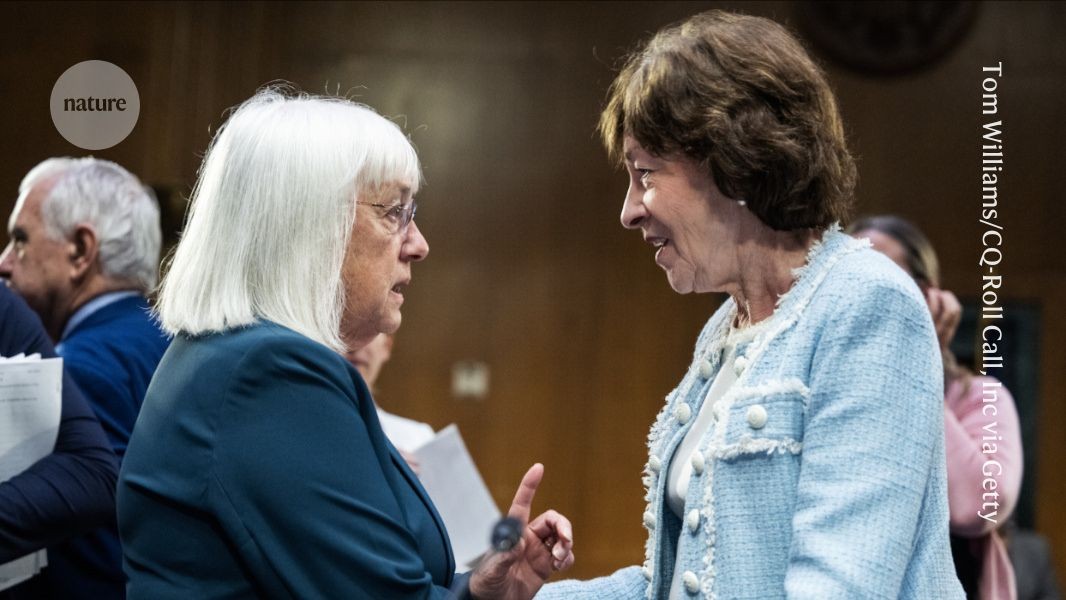Senator Susan Collins (right), a Republican from Maine, chats with Senator Patty Murray (left), a Democrat from Washington state, at an appropriations committee meeting on 10 July.Credit: Tom Williams/CQ-Roll Call, Inc via Getty
A key US Senate committee has indicated that it will reject the massive budget cuts that President Donald Trump proposed for some science agencies, including the US National Science Foundation (NSF) and NASA. The US Senate Committee on Appropriations was prepared to vote today to advance a bill laying out fiscal year 2026 funding for science. However, the senators came to an impasse on an unrelated matter — the location for the new headquarters of the Federal Bureau of Investigation (FBI) — and the committee went into a recess for an unknown length of time.
But the hearing today was the first hint that the US Congress, which controls government spending, might ignore Trump’s wishes.
If enacted, Trump’s proposal would have a devastating effect on US science; earlier this week, the American Association for the Advancement of Science released an analysis suggesting that the proposal would cut all federally-funded basic research by one-third. Scientists, advocacy groups and lobbyists have been pleading with members of Congress in the past several weeks to protect funding for research agencies. The campaign appears to be working: under the Senate committee’s bill, the NSF budget would drop by only 0.67%, rather than by 57% as Trump requested, and many NASA space and Earth-science missions would continue rather than being shut down (see ‘Request rebuffed’). “This bill protects key science missions,” Jerry Moran, a Republican senator from Kansas, said at the meeting.
Sources: NSF/American Institute of Physics/NASA
To become law, the bill must be approved by the full Senate, as well as the lower chamber of Congress — the US House of Representatives — and ultimately signed by the president. It is separate from legislation to fund other science agencies, such as the National Institutes of Health, and the ‘Big Beautiful Bill’, which is tax-and-spending legislation that was signed into law last week.
During Trump’s first presidency, from 2017 to 2021, Congress largely preserved research funding in the face of the president’s proposed cuts. But this year, even if Congress ultimately passes a budget supporting science agencies, many policy watchers worry that the Trump administration might simply ignore it. So far this year, the White House has downsized government spending by firing thousands of federal workers, including scientists; clawed back Congressionally-appropriated funds for the current fiscal year; and instructed at least some federal agencies to plan for next year as if Trump’s proposed cuts were law.
Although the Senate bill is far from being passed, there is “cautious optimism, as opposed to the doom and gloom over the past three months”, says Kenny Evans, a science-policy specialist at Rice University in Houston, Texas. “If there’s real appetite for bipartisan commitment to the science budgets, that’s a huge win.”
Reductions denied?
Some of the deepest cuts in the president’s budget request were aimed at the NSF, which funds 25% of federally-backed basic research at US universities. Under Trump’s request, the agency’s budget would have been slashed from US$9 billion to $3.9 billion. Under this scenario, the NSF would be able to hand out only about one-quarter of its current research grants, reducing the success rate for applicants from about 26% to just 7%. The cuts would affect nearly all parts of the NSF. For instance, one of the agency’s greatest successes, the Laser Interferometer Gravitational-Wave Observatory (LIGO) — which detects ripples in space-time from collisions in the Universe — would have to shutter one of its two sites.
Trump proposes unprecedented budget cuts to US science
The depth of the proposed cuts surprised many onlookers, but they aligned closely with a 2023 proposal from a right-wing organization led by Russell Vought, now director of the White House’s Office of Management and Budget. The White House has justified the cuts by casting the NSF as “woke”, and stating that it is “re-focusing investments in the priority areas” of quantum science and artificial intelligence — although the request kept NSF funding in these areas relatively flat.
At NASA, Trump had proposed slashing the agency’s science budget nearly in half, which would have shuttered more than 40 projects such as building and launching Earth-observing satellites and future space telescopes. All of NASA’s living former science chiefs roundly criticised the proposed cuts in a 1 July letter to Congress. Cutting NASA science would “cede leadership to other countries”, says John Grunsfeld, a former astronaut who ran the agency’s science division from 2012 to 2016. “I’m cautiously optimistic the Senate will provide adequate funding for NASA science, but overall worried about US leadership in science and cuts to critical research.”

